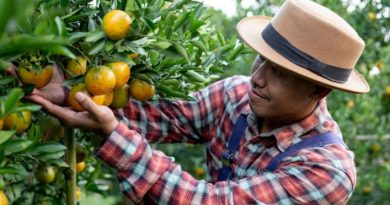Exploring the Profitability of Farming in Nigeria
Last Updated on August 28, 2023
Introduction
Brief overview of the farming industry in Nigeria
Nigeria has a vibrant farming industry with diverse agricultural practices and a rich variety of crops and livestock.
Importance of exploring the profitability of farming in Nigeria
Exploring the profitability of farming in Nigeria is crucial for sustainable economic growth and food security.
Brief Overview of the Farming Industry in Nigeria
Nigeria boasts diverse agricultural landscapes and abundant resources, fostering a robust farming industry. With a vast population, agriculture plays a pivotal role in the economy. The sector encompasses crops, livestock, and aquaculture.
Importance of Exploring the Profitability of Farming in Nigeria
- Economic Growth: Farming contributes significantly to Nigeria’s GDP, creating employment opportunities and reducing poverty.
- Food Security: Enhancing farming profitability ensures a stable food supply for the nation’s growing population.
- Export Potential: Profitable farming opens doors for exporting surplus produce, boosting foreign exchange earnings.
- Rural Development: Farming profitability uplifts rural communities by generating income and improving infrastructure.
- Entrepreneurship: Exploring profitability encourages agribusiness startups, fostering innovation and investment in the sector.
- Technology Integration: Pursuing profitability drives the adoption of modern techniques, improving productivity and efficiency.
- Climate Resilience: Profitable farming can promote sustainable practices that mitigate the impact of climate change.
- Value Addition: Exploring profitability encourages agro-processing, increasing the value of raw agricultural products.
- Government Revenue: The farming industry’s profitability contributes to tax revenue, enabling investment in other sectors.
- Skills Enhancement: Profitable farming motivates farmers to seek training and education, enhancing their expertise.
In essence, understanding and enhancing the profitability of farming in Nigeria go beyond individual gain. It’s a crucial step towards national development, food security, economic stability, and a prosperous future.
Agricultural Potential in Nigeria
- Rich and diverse natural resources: Nigeria is blessed with a variety of natural resources, such as fertile soil, minerals, and water bodies, which create a conducive environment for farming.
- Favorable climatic conditions: The country experiences two main climatic zones – the tropical rainforest in the south and the arid and semi-arid regions in the north.
This diversity allows for the cultivation of a wide range of crops. - Vast arable land: Nigeria has a large expanse of arable land, making it suitable for different types of farming activities. This provides opportunities for expansion and diversification in the agricultural sector.
- Growing population and increasing food demand: With a population of over 200 million people, Nigeria has a significant domestic market for agricultural products.
The demand for food is ever-increasing, presenting a profitable prospect for farmers.
Farmers in Nigeria have immense potential to tap into the country’s agricultural opportunities and achieve profitability.
Let’s explore the factors that contribute to this potential in more detail.
Rich and diverse natural resources
Nigeria boasts a wealth of natural resources that are essential for successful farming.
The fertile soil found in various regions enables farmers to cultivate a wide range of crops, from staple foods like rice, maize, and cassava to cash crops like cocoa and palm oil.
Additionally, Nigeria is rich in minerals, such as limestone, granite, and marble, which benefit the agriculture sector.
These minerals can be used for soil improvement, construction of infrastructure, and agricultural machinery.
The presence of abundant water bodies, including rivers, lakes, and dams, provides irrigation opportunities to farmers. This access to water ensures a year-round farming cycle and increases productivity, particularly in dry areas.
Favorable climatic conditions
Nigeria’s climatic conditions support a diverse range of agricultural activities. In the southern part of the country, the tropical rainforest climate fosters the cultivation of crops like cocoa, rubber, and timber.
In the arid and semi-arid regions of the north, farmers can take advantage of the dry conditions to grow crops like millet, sorghum, and cowpea.
These crops are well-adapted to limited water availability and can withstand high temperatures.
Furthermore, the country’s geographical location close to the equator ensures an even distribution of sunlight and warmth throughout the year, promoting crop growth and reducing the risk of frost and cold damage.
Vast arable land
One of Nigeria’s greatest agricultural assets is its vast expanse of arable land. The country has approximately 84 million hectares of cultivable land, of which only around 40% is currently being utilized.
This untapped potential provides farmers with opportunities for expansion, diversification, and investment in modern agricultural practices.
It allows for increased crop production, the introduction of new varieties, and the implementation of efficient farming systems.
Growing population and increasing food demand
Nigeria’s population is rapidly growing, and with that comes a rising demand for food. The country has a large domestic market for agricultural products, offering farmers a guaranteed customer base.
The increasing urbanization and changing dietary preferences contribute to the demand for a variety of food items, including fruits, vegetables, poultry, and dairy products.
This presents favorable conditions for farmers to cater to a diverse range of consumer needs and preferences.
Nigeria possesses significant agricultural potential due to its rich and diverse natural resources, favorable climatic conditions, vast arable land, and a growing population with an increasing demand for food.
Farmers can harness these opportunities to achieve profitability and contribute to the nation’s food security and economic development.
Read: The Role of Farmer Cooperatives in Nigeria
Types of Profitable Farming Ventures in Nigeria
Crop farming
- Cash crops (e.g., cocoa, oil palm, rubber)
- Food crops (e.g., maize, rice, yam)
Livestock farming
- Poultry farming
- Cattle rearing
- Fish farming
When it comes to profitable farming ventures in Nigeria, there are various options to consider. Here, we will explore the different types of farming activities that can yield significant profits for farmers.
Crop farming
- Cash crops (e.g., cocoa, oil palm, rubber): Cash crops are highly profitable farming ventures in Nigeria. These crops, such as cocoa, oil palm, and rubber, have a high demand both domestically and internationally.
Cultivating cash crops can generate substantial income for farmers. - Food crops (e.g., maize, rice, yam): Food crops are another profitable farming venture in Nigeria. Nigeria has a large population, and food crops like maize, rice, and yam are staple foods.
The demand for these crops is consistently high, making them lucrative options for farmers.
Livestock farming
Livestock farming also offers profitable opportunities for farmers in Nigeria. The following livestock farming ventures are known to be particularly profitable:
- Poultry farming: Poultry farming involves raising chickens for their meat and eggs. The demand for poultry products is consistently high in Nigeria, making this a profitable venture for farmers.
Proper management and quality control are essential for success in poultry farming. - Cattle rearing: Cattle rearing is another profitable livestock farming venture. Cattle are reared for various purposes, including dairy products, meat, and leather.
With proper breeding and good market access, cattle rearing can be a lucrative business in Nigeria. - Fish farming: Nigeria’s vast water resources make fish farming a highly profitable venture. The country has a high demand for fish, and fish farming ensures a steady supply.
Catfish and tilapia are popular fish species for farming in Nigeria. Fish farming requires proper knowledge of fish management and suitable farm facilities.
The profitability of farming in Nigeria is evident through various crop and livestock farming ventures.
Cash crops like cocoa, oil palm, and rubber, as well as food crops like maize, rice, and yam, yield substantial profits.
Livestock farming, including poultry farming, cattle rearing, and fish farming, also provides lucrative opportunities for Nigerian farmers.
With proper planning, management, and market access, these farming ventures can contribute significantly to the agricultural sector’s profitability in Nigeria.
Read: Success Stories: Inspiring Nigerian Farmer Entrepreneurs

Factors influencing profitability in Nigerian farming
Access to modern farming techniques and technology
- Adoption of modern farming techniques can increase productivity and reduce costs.
- Technologies such as mechanization, precision farming, and biotechnology can improve efficiency.
- Access to advanced tools and equipment helps farmers optimize their operations.
Availability of agricultural inputs (seeds, fertilizers, pesticides)
- Access to high-quality seeds ensures good crop yield and quality.
- Availability of fertilizers and pesticides helps control pests and enhance plant growth.
- Reliable suppliers and affordable prices for inputs are crucial for profitability.
Quality and reliability of infrastructure (transportation, storage, irrigation)
- Efficient transportation networks ensure timely delivery of agricultural produce to markets.
- Proper storage facilities prevent post-harvest losses and maintain product quality.
- Access to reliable irrigation systems is crucial for reducing dependency on rainfall.
Government policies and support for the agricultural sector
- Favorable policies promoting agricultural development attract investments and encourage farmers.
- Government subsidies, grants, and loans help farmers access financial resources.
- Supportive policies for research and development drive innovation and technology adoption.
Market demand and prices
- High demand for agricultural products leads to increased profitability.
- Price stability ensures farmers can secure reasonable returns on their investments.
- Market information and access to reliable buyers enable farmers to make informed decisions.
Various factors influence profitability in Nigerian farming.
Access to modern farming techniques and technology, availability of agricultural inputs, quality and reliability of infrastructure, government policies and support, and market demand and prices all play vital roles in determining the success and profitability of farming in Nigeria.
Read: How to Become an Agricultural Operations Manager in Nigeria
Challenges and risks faced by Nigerian farmers
Inadequate access to credit and finance
Nigerian farmers often struggle to access credit and finance, hindering their ability to invest in their farms and expand their operations.
Climate change and unpredictable weather patterns
The changing climate and unpredictable weather patterns pose significant challenges to Nigerian farmers, affecting crop yields and livestock productivity.
Infestation of pests and diseases
Nigerian farmers face the constant threat of pests and diseases that can ravage their crops and livestock, leading to significant losses.
Lack of proper storage and processing facilities
Proper storage and processing facilities are essential for preserving the quality and value of agricultural produce, but many Nigerian farmers lack access to these facilities.
Inefficient marketing and distribution channels
“Nigerian farmers face obstacles hindering profit and growth:
- Limited market access and distribution hinder profit and reach.
- Inadequate credit affects investment in techniques, seeds, and equipment.
- Climate change disrupts yields, necessitating resilient approaches.
- Pest and disease infestations result in financial losses.
- Inadequate storage and processing facilities contribute to spoilage.
- Inefficient marketing channels reduce profitability and reach.
Addressing these issues is pivotal for sustainable and profitable agriculture in Nigeria.
Read: Case Study: Successful Poultry Producers in Nigeria
Successful Farming Case Studies in Nigeria
Profiles of farmers who have achieved profitability
Crop farming success stories
- Adeola Adebayo, a young farmer from Ogun State, started with a small plot of land and successfully grew maize and vegetables.
- Michael Okonkwo, a farmer from Anambra State, specialized in cassava farming and has created a profitable business from it.
- Funmi Adekunle, a female farmer from Ekiti State, ventured into tomato farming and significantly increased her income.
Livestock farming success stories
- Abubakar Ibrahim, a Fulani herdsman in Kano State, turned his modest cattle rearing operation into a thriving business.
- Hassan Abdullahi, a poultry farmer in Lagos, achieved profitability by implementing modern techniques and focusing on quality.
- Grace Ojo, a goat farmer from Kwara State, successfully bred and sold high-quality goats, generating substantial profits.
Lessons learned from their experiences
- Diversification is key: Successful farmers have learned to diversify their operations by growing different crops or raising multiple livestock.
- Market research is crucial: Understanding market demands and consumer preferences helps farmers identify profitable opportunities.
- Focus on quality: Providing high-quality produce or livestock ensures premium prices and a loyal customer base.
- Adopt modern farming techniques: Embracing technology and innovative farming practices enhances productivity and profitability.
- Networking and collaborations: Successful farmers exchange ideas, form partnerships, and collaborate with others in the industry.
- Continuous learning: Staying updated with the latest agricultural knowledge and attending training programs helps improve farming practices.
- Access to finance: Farmers who secured loans or grants for investment in farming equipment and infrastructure have achieved profitability.
- Government support and policies: Policies that promote agriculture, provide subsidies, and improve infrastructure have aided successful farmers.
- Proactive pest and disease management: Effective pest control measures and disease prevention strategies minimize losses and maximize profits.
Nigeria has seen numerous successful farming case studies where farmers have achieved profitability. Adeola Adebayo, Michael Okonkwo, Abubakar Ibrahim, and others serve as inspirations for aspiring farmers.
Their experiences highlight the importance of diversification, market research, quality focus, modern techniques, networking, continuous learning, access to finance, government support, and proactive pest and disease management.
These lessons can guide and empower future farmers in Nigeria toward profitability in their farming ventures.
Government initiatives and support for Nigerian farmers
Programs promoting agricultural development
- Agricultural Transformation Agenda (ATA): A government initiative to stimulate agricultural growth and create jobs.
- Growth Enhancement Support Scheme (GES): Provides farmers with subsidized agricultural inputs.
- National Agricultural Extension and Advisory Services (NAEAS): Offers guidance and training to farmers.
- Youth Agribusiness Development Initiative (YADI): Program aimed at engaging young Nigerians in farming ventures.
- Anchor Borrowers’ Program: Provides loans to smallholder farmers to boost production and reduce imports.
Financial assistance and incentives
- Agricultural Credit Guarantee Scheme Fund (ACGSF): Provides loans to farmers at low-interest rates.
- Agricultural Insurance Scheme: Protects farmers against losses due to natural disasters and unforeseen circumstances.
- Tax incentives: The government offers tax breaks to agricultural businesses and incentives for investments in the sector.
- Access to finance: The government facilitates access to agricultural loans and grants from financial institutions.
- Price support schemes: The government sets minimum prices for certain agricultural products to ensure profitability.
Training and education opportunities
- Farmer Field School (FFS): Hands-on training for farmers to learn best practices in crop cultivation.
- Agricultural colleges and universities: The government supports agricultural education institutions to train skilled farmers.
- Vocational and technical training centers: Provide specialized training in agribusiness and farming techniques.
- Entrepreneurship development programs: Offer training on agricultural value addition and market linkages.
- Farmer cooperatives: The government supports the formation of cooperative societies to enhance knowledge exchange among farmers.
Infrastructure development projects
- Irrigation facilities: The government invests in building and rehabilitating irrigation systems to improve water availability.
- Rural road construction: Connects remote farming communities to markets, reducing transportation costs.
- Storage and processing facilities: The government promotes the establishment of warehouses and processing plants.
- Market development: Encourages the creation of modern markets to facilitate the sale of agricultural produce.
- Power supply improvement: The government invests in rural electrification to provide reliable energy for agricultural activities.
The Nigerian government has implemented various initiatives to support and promote the profitability of farming in the country.
These programs focus on agricultural development, financial assistance, training and education, and infrastructure development.
By providing resources, incentives, and infrastructure to farmers, the government aims to boost agricultural productivity, create employment opportunities, and improve food security in Nigeria.
Conclusion
Recap of the profitability potential in Nigerian farming
Nigerian farming offers immense profitability potential due to the favorable climate, abundant arable land, and high demand for agricultural products.
Importance of addressing challenges and implementing supportive measures
To maximize profitability in Nigerian farming, it is crucial to address challenges such as inadequate infrastructure, limited access to finance, and inconsistent government policies.
Implementing supportive measures like improved irrigation systems and training programs can significantly boost the sector.
Encouragement for aspiring farmers to explore the opportunities available
Aspiring farmers in Nigeria should be encouraged to explore the vast opportunities available in the sector.
With proper planning, market research, and access to resources, they can achieve great profitability and contribute to the country’s food security and economic growth.
Nigerian farming holds great profitability potential, but addressing challenges and implementing supportive measures is vital for success.
Aspiring farmers should seize the opportunities available and contribute to the development of one of Nigeria’s key sectors.


